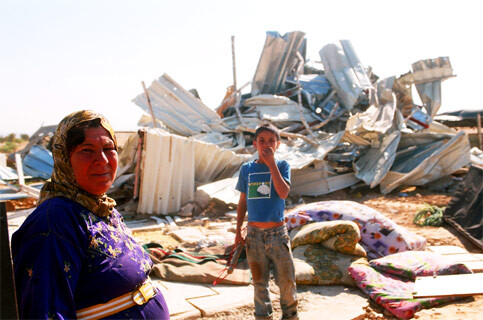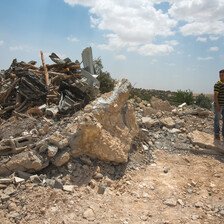The Electronic Intifada 26 June 2007

A woman and her child standing in front of their demolished home in Atir. (Shabtai Gold/IRIN)
ATIR (NEGEV DESERT), 26 June 2007 (IRIN) - At least 20 houses in two Bedouin-Arab villages were destroyed on 25 June by Israeli security forces, leaving over 150 people homeless.
Some 1,500 police and special forces converged on the two small villages, which together have a population of about 1,000 people from the al-Qi’an family, and conducted the demolitions.
“The children went to school and the men to work. Only the women stayed home,” said Azam al-Qi’an, aged 16, whose home was destroyed.
“Many, many police came. At around 8am they started coming,” said Zahara, holding her three-year-old grandchild.
“When the police came in, they began pushing the women. They didn’t give us a chance to get our belongings out of the house. They took everything out and confiscated it. Then the bulldozers started destroying [the houses]. When we protested, they called us whores.”
Bedouin living on land “illegally”
The Israel Land Administration (ILA) says the villagers live on the land “illegally” and asked the courts for demolition orders in 2004.
When the ILA went to court to get the villagers out, they said in their documents that the villagers were “trespassers” on “state land.” Therefore, the ILA said, the villagers must be moved out.
ILA spokeswoman Ortal Tzabar told IRIN that over the years the ILA had tried to reach deals with the villagers in return for their eviction, but the villagers rejected the deals.
The villagers, for their part, have said they do not want to be sent to urban areas as the towns the state built for the Bedouins are basically townships and ghettos, with high crime and unemployment rates (among the highest in the country for both). They say some of them had agreed in the past few days to leave in return for compensation, but the ILA destroyed their homes before a deal could be finalized.
They also said the ILA does not really want to give them compensation. Some said the compensation offered was too low, and that the land was worth much more.
“Nearly all the homes in Um Heiran have demolition orders hanging over them, and may yet be destroyed,” said Souhad Bishara, a lawyer from Adalah — an NGO that advocates the civil rights of Israel’s Arab minority — who represents some of the villagers.
Mickey Rosenthal, a spokesperson for the Israeli police, told IRIN on 26 June that the police had no comment, as they “just provided security,” and that two police officers were slightly injured during the demolitions.
Ali, Zahara’s husband, has given up on his belongings.
“They told us they’d give them back in 30 minutes. But it’s been hours! I’m not hopeful of getting them back,” he said.
“They took money, clothing, our gold, and the children’s cribs. Now we have no electricity — they took away the generator. And the fridge. What will the children do for milk?” asked Fayiqa, her children clinging to her dress.
“They even took away the flour. There is no bread, just some donations. They took away the milk, and even the children’s school books,” said Ali. His daughter, a sixth grader, nods her head and names the different books missing.
“When the children got home from school, they began to cry for their homes,” Fayiqa said.
“Unrecognized” status
The two villages, Atir and Um Heiran, are “unrecognized” villages. They have no official status, are absent from state planning and government maps, and are entitled to few services. There are about 45 such villages in Israel’s southern Negev desert.
The villagers bring in water in tankers, and electricity comes from generators, as they are not connected to the national grid. Nearly all the residents hold Israeli citizenship.
The al-Qi’ans became internally displaced persons following the 1948 Arab-Israeli war. After losing their farmland in the hostilities, they wandered until the state placed them in 1956 on the land they now inhabit.
“They kicked us out of our homes once, in 1948, and forced us onto this land. Now they want to remove us by force. We have nowhere else to go,” said Sheikh Ali Abu Qi’an.
The state is now trying to move over 1,000 members of the Al-Qi’an tribe to a town, in order to build a new Jewish village on Atir and Um Heiran, as shown in state planning documents, obtained by Adalah.
Aid arrives
Islamic charities from nearby villages quickly donated some food and mattresses and makeshift tents were erected.
“We will have to sleep on the ground tonight. It will be cold. Today it was very hot, and there were strong winds which blow the sand around,” said Sheikh Ali, sitting under a canopy.
“Tomorrow, they say it will be even hotter. What will we do?” ask several women holding their youngest children, as another gust of wind churns up the desert sand.
This item comes to you via IRIN, a UN humanitarian news and information service, but may not necessarily reflect the views of the United Nations or its agencies. All IRIN material may be reposted or reprinted free-of-charge; refer to the copyright page for conditions of use. IRIN is a project of the UN Office for the Coordination of Humanitarian Affairs.
Related Links


